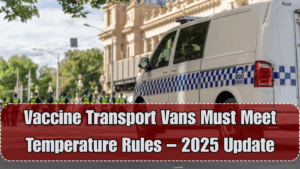The Government of India has implemented a new mandate in August 2025, requiring every cold chain medicine van to strictly follow enhanced temperature regulations while transporting vaccines and other temperature-sensitive drugs. This move is part of the National Pharma Safety Program and aims to prevent vaccine spoilage during road transit.
Temperature compliance is critical for preserving the potency and effectiveness of essential medical products like vaccines, insulin, and biotech drugs. The latest reforms under the cold chain medicine van regulation ensure real-time monitoring, certified storage infrastructure, and standardized delivery practices across the pharmaceutical transport network.

What Has Changed in Vaccine Cold Chain Logistics?
Starting August 2025, every cold chain medicine van must meet a strict set of operational criteria. These updates are meant to eliminate fluctuations during long-distance transport, especially in remote regions where temperature control has often been a challenge.
Key Compliance Requirements:
-
Refrigeration Units (2°C to 8°C) mandatory in all vaccine vans
-
Real-time GPS and temperature tracking systems
-
Insulated packaging with backup cooling systems
-
Power backups (battery/inverter-based) for uninterrupted cooling
-
Daily temperature logs submitted to regional health authorities
-
All drivers and loaders trained in cold chain handling
These rules bring India’s vaccine logistics infrastructure on par with global best practices.
Which Vehicles Need to Comply?
The new rules apply to all cold chain medicine vans transporting:
-
COVID-19 vaccines
-
Polio and Hepatitis vaccines
-
Biotech injections
-
Human insulin
-
Blood plasma and related items
Table: New Compliance Checklist for Cold Chain Medicine Vans
| Requirement | Mandatory From August 2025 | Applies To |
|---|---|---|
| Insulated vehicle compartments | Yes | All vaccine vans |
| Temperature maintenance (2–8°C) | Yes | All perishable medicines |
| Backup cooling system | Yes | Vehicles traveling over 2 hours |
| Driver training certificate | Yes | All drivers handling cold chain cargo |
| Daily monitoring reports | Yes | Submitted to pharma depots & MoHFW |
| Emergency alert system | Yes | Auto-alert for temperature breach |
The cold chain medicine van now plays a pivotal role in India’s healthcare logistics, ensuring that every vaccine reaches its destination safe and effective.
Why the 2025 Cold Chain Reform Was Needed
With India’s expanding immunization campaigns and increase in biologics production, there was a growing concern over spoilage during rural and interstate transport. Faulty refrigeration and unmanaged delays often led to:
-
Loss of vaccine efficacy
-
Drug wastage and financial losses
-
Risks to patient safety
-
Compliance violations during exports
The cold chain medicine van rules introduced in 2025 directly address these risks through proper training, tracking, and accountability.
Benefits of the Updated Cold Chain System
The updated guidelines ensure safer and smarter delivery of life-saving medicines. Here’s how they help:
-
Zero tolerance for cold chain failure
-
Real-time data shared with health authorities and pharma companies
-
Longer shelf life for temperature-sensitive drugs
-
Better rural coverage without potency compromise
-
Reduced vaccine recalls due to better storage consistency
These improvements reinforce India’s reliability in vaccine manufacturing and delivery on both national and global levels.
FAQs
What is a cold chain medicine van?
It’s a specially designed vehicle equipped with temperature-controlled systems to transport vaccines and sensitive pharmaceuticals safely.
What are the new rules for these vans in 2025?
From August 2025, every cold chain medicine van must maintain a temperature between 2°C and 8°C, have backup cooling, GPS tracking, and submit daily logs to health authorities.
Are these vans needed for all drugs?
No. Only vaccines, biologics, insulin, and certain injectable drugs that require cold storage during transport need these vans.
What if temperature breaks during delivery?
If a cold chain medicine van experiences a temperature breach, an alert is triggered and the consignment may be rejected depending on exposure time.
Is driver training part of the new regulation?
Yes. All drivers and handlers must be certified in cold chain handling and must understand emergency procedures in case of cooling system failure.
Click here to know more.
